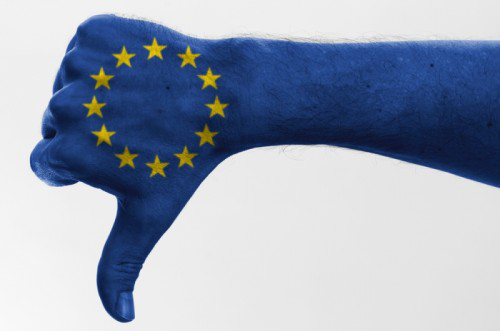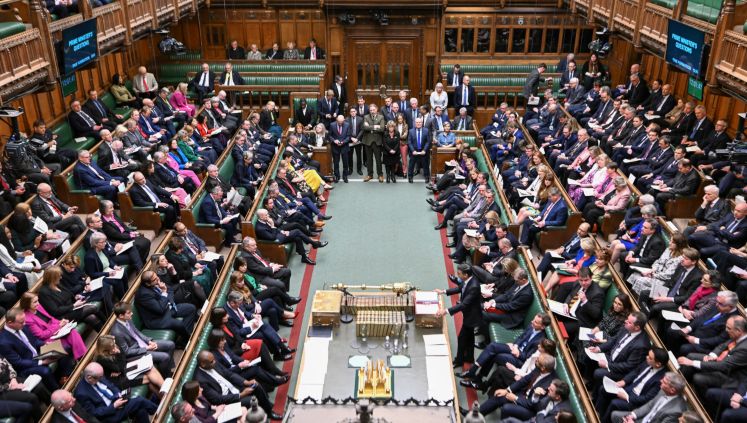
 The Conservative Party’s position on Europe remains ambiguous – far from resolving the issue, the promise of a referendum has the party all over the place. By contrast Labour’s pro-EU position now looks set to become clear. And yet in the past it was the Tories who championed greater integration in Europe. Richard Carr and Bradley Hart trace their journey from the party of Europe to the party of cautious Eurosceptics.
The Conservative Party’s position on Europe remains ambiguous – far from resolving the issue, the promise of a referendum has the party all over the place. By contrast Labour’s pro-EU position now looks set to become clear. And yet in the past it was the Tories who championed greater integration in Europe. Richard Carr and Bradley Hart trace their journey from the party of Europe to the party of cautious Eurosceptics.
Since 2010 David Cameron has rather thrown the traditional Conservative antipathy to constitutional reform out of the window. He has acquiesced to fixed term parliaments, a vote on Scottish independence in November and, should the Tories emerge victorious in 2015, a referendum on British membership of the European Union by the end of 2017. The Tories – partly driven by the necessities of coalition, partly by reasons of internal party management – suddenly seem very radical indeed.
It is Europe that is arguably again most prominent of the recent manoeuvres, despite splitting the party in the 1990s, and contributing to disastrous electoral performances in 1997 and 2001. In his January 2013 Bloomberg speech, Cameron stated that unless his negotiations with the EU resulted in the repatriation of significant powers – he is yet to define exactly what these include – then the Conservative Party would be prepared to campaign to leave the European Union. He claims to hope to keep the country in, but he may end up leading it out.

As we show in our recent edited volume on The Foundations of the British Conservative Party, this ignores the historic Conservative trend in favour of participation in any European union. Modern pro-Europeans like Laura Sandys, Damian Green and Ken Clarke are not somehow alien to the Tory tradition, but steadfast within it (particularly Sandys, who follows her father Duncan in such leanings). The history on this is fascinating, not least because it jars with contemporary political attitudes on the one hand, and the view that all diplomatic machinations in the 1920s and 1930s involved some combination of totalitarians like Mussolini or Hitler on the other. It is therefore worth setting out.
Well before Macmillan’s various woes of the 1950s/1960s and indeed Ted Heath leading the UK into the EEC in the 1970s, the Austrian aristocrat Richard Coudenhove-Kalergi created an interwar International Pan-European Union (PEU). It is an often forgotten that it included a number of leading Tories (and Liberals) in its membership, and enjoyed extensive financial support from Conservative businessmen in the 1930s and 1940s.
Circles within the Labour Party, for their part, were concerned that the PEU and pan-Europeanism more generally was a tool of big business too closely aligned with the Conservatives to play a role in working-class politics. As a result, as we show in our joint essay in the aforementioned volume, invitations to the crucial Hague Congress of 1948 were overwhelmingly offered to Liberals and Conservatives with comparatively few Labour members included. Pro-European Labour MPs were even warned off expressing sympathies for the pro-European cause. Part of the reason Herbert Morrison famously declared the Durham miners ‘wouldn’t wear’ the idea of Europe was because it was in some sense viewed as the highest stage of capitalism, a view forwarded in later decades by Tony Benn and Barbara Castle. The historic precedent indicates they had something of a point.
What accounts for this apparent change from the pro-business pan-Europeanism of the Second World War period to the Tory Euroscepticism of today? The answer seems in part to lie in Britain’s relationship with the United States, and in particular the Conservative Party’s perception of both the ‘Special Relationship’ and Britain’s place in the world per se. It is worth remembering that even in 1940 there was no guarantee that the U.S. would intervene on Britain’s side in the war against Germany. Longer term, the Americans were also seen as emergent rivals in a number of important spheres. In 1929 for instance Charles Howard-Bury, Conservative MP for Chelmsford, argued in the House of Commons that the only way to combat high American tariffs was to ‘discuss the possibility of the formation of an economic united states of Europe’. American economic power, ascendant and clearly a potential threat to the Empire, was clearly at the forefront of these concerns.
Coudenhove-Kalergi courted interwar Conservative leaders by appealing to similar concerns, telling Leo Amery in 1931 that pan-Europeanism could be part of an effort of ‘forming a necessary element of equilibrium towards the Soviets and America’ in the future. After the end of the Second World War, there was widespread fear that the Americans might withdraw from European affairs as the post-Woodrow Wilson Republican administrations had done throughout the 1920s. With Conservative politicians increasingly aware of Britain’s imperial decline after 1945, either the United States or Europe had to serve as a partner in a likely uncomfortable international peace with the Soviet Union on the one hand, and administer whatever remained of the Empire on the other. With America’s reliability in both open to question, pan-European union was seen as perhaps the only alternative.
Partly then, this was the result of pragmatism. If America could not defend Britain against the Soviet Union then wider Europe might have to do. Yet such a view would ignore the cosmopolitan nature of 1945-era Conservatism on the one hand, and an aversion to the ‘little Englander’ type on the other. As with the most openly pro-Europe party leader in current British politics – Nick Clegg, a half Dutch man whose wife is Spanish and whose children speak a number of European languages – many of the Conservatives who were most in favour of European engagement or even federalism were themselves au fait with other tongues. Anthony Eden spoke fluent French, with Ted Heath’s later accented variant an attempt to do similar. During the interwar period Leo Amery and Edward Spears were but two of many Conservatives proficient in a foreign language. In a literal sense, Conservatives of this era could talk to their potential European partners. How many Tories have such skills, or admit to them, today?
As events turned out, the United States did not disengage from Europe after 1945, instead pursuing a policy of Containment against the spread of Soviet communism. The Marshall Plan invested billions of American dollars into the rebuilding of European cities, putting the Soviets on the defensive as they prevented the Eastern Bloc from accepting the Truman Administration’s offer of funds. The Americans would clearly be a more reliable partner after 1945 than they had been after 1918, moving the responsibility for maintaining collective security in Europe from London and Paris to Washington. Even with the British Empire on its deathbed, Europe would take a backseat to the rising economic and political power of the United States, particularly as the Bretton Woods system effectively ended British complaints about American tariffs in favour of U.S. dominance. The $5bn loan negotiated by John Maynard Keynes on behalf of the Attlee government lent the British a direct financial tie to their American cousins, as much of Europe negotiated similar bilateral deals. London-Washington or Frankfurt-New York became arguably more intertwined than relations between the UK and the new EEC.
Where does this leave the Conservatives and the question of Europe today? Paradoxically, much the same as they were in the late 1920s. Britain today no longer fears American protectionism, in part because it has integrated into the European marketplace in much the way the pro-business factions of the Conservative Party might have wished. To withdraw completely from Europe would likely have devastating consequences for the British economy. UKIP’s appeal is to some degree predicated on withdrawal from the EU (as well as a general anti-politics agenda), but how exactly this would occur remains unclear. “Brussels,” “bureaucrats” and “banking regulations” may mark anti-EU Tory discourse, but “business” is surely the order of the day, particularly in these days of financially straitened times and five year projections from the OBR which rely on economic stability. Fundamentally, these interests make the Conservatives a party of ‘in’ more than ‘out’. Yet to wholeheartedly embrace these views would be politically dangerous, particularly at a time of rising right-wing populism abroad, and Nigel Farage at home. The rational business case on the one hand, and the longer term belief in a common European civilization on the other, are not perhaps as high up the political agenda as they have been.
There are many paradoxes in all of this, not least the fact that there are many lessons the Conservatives can learn from Europe – especially, as recently noted on this blog, from Germany. Equally, whilst the Tories often allege that Labour has ducked the big questions on the economy because of the desire to remain popular, it could well be argued that the Conservatives are about to lead the country out of the EU against what a significant tranche of that party would acknowledge to be in the economic national interest. Far from resolving the issue, in many ways the referendum has the party all over the place. And by contrast, on Europe, Labour’s position looks set to become pretty clear. Ed Miliband has now pledged not ‘to hold a gun to [our] own head’ on the issue of EU reform, suggesting a binding commitment to an EU referendum is not exactly forthcoming from across the parliamentary aisles. If people like the EU they will very likely vote Labour in 2015 (Lib Dem diehards apart), and if they viscerally hate it, they will vote UKIP. The Conservative position remains ambiguous for all the reasons given here.
Throughout this parliament David Cameron’s aristocratic, Etonian background has received much public comment. Ironically however, he may be about to turn his back on the cosmopolitan tradition of his more patrician Conservative predecessors, and take Britain into territory unknown for over forty years. The Tories have set out a fudge designed to crush squabbles on the right. They have not achieved this. Now they will have to deal with the consequences.
Note: This article gives the views of the authors, and not the position of the British Politics and Policy blog, nor of the London School of Economics. Please read our comments policy before posting.
About the Authors
 Dr Richard Carr is a Lecturer in History at Anglia Ruskin University and a member of the Labour History Research Unit. He is the author of One Nation Britain: History, the Progressive Tradition and Practical Ideas for Today’s Politicians, published by Ashgate this summer.
Dr Richard Carr is a Lecturer in History at Anglia Ruskin University and a member of the Labour History Research Unit. He is the author of One Nation Britain: History, the Progressive Tradition and Practical Ideas for Today’s Politicians, published by Ashgate this summer.
 Dr Bradley W. Hart is a Lecturer at the Department of Political Science, California State University, Fresno. He is the co-editor of The Foundations of the British Conservative Party: Essays on Conservatism from Lord Salisbury to David Cameron, published by Bloomsbury Academic last year.
Dr Bradley W. Hart is a Lecturer at the Department of Political Science, California State University, Fresno. He is the co-editor of The Foundations of the British Conservative Party: Essays on Conservatism from Lord Salisbury to David Cameron, published by Bloomsbury Academic last year.








What people tend to forget is that Cameron won by a less than 40% plurality, while his two liberal opponents split the liberal vote and cancelled each other out. Cameron was appropriately humble when taking office after his “victory,” but is so no longer.